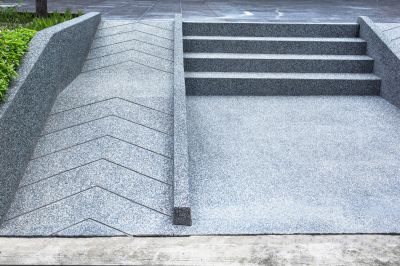Atlanta - Disability Ramp Installation
Get help with your disability ramp installation needs. Fill out the form above and we will connect you with local pros in your area. Installing a disability ramp can greatly improve accessibility and mobility for individuals with disabilities. Disability ramp installation ensures that people with limited mobility can easily navigate entrances, exits, and other areas of their home or building. These ramps are designed to meet specific requirements and regulations, ensuring safety and convenience for wheelchair users, those with walkers, and individuals with other mobility challenges. By investing in disability ramp installation, individuals can enjoy increased independence and freedom to move around with ease. Whether it's for residential or commercial purposes, disability ramp installation offers a practical and inclusive solution for creating an inclusive environment for everyone.
When it comes to creating accessible spaces, the installation of disability ramps plays a crucial role. These ramps are specifically designed to provide a safe and convenient pathway for individuals with disabilities, allowing them to navigate various environments with ease. Disability ramp installation involves the construction and placement of ramps that comply with accessibility guidelines and regulations. These ramps are constructed using durable materials and are designed to withstand different weather conditions. By installing disability ramps, businesses and organizations can ensure inclusivity and equal access for all individuals. Whether it is for public buildings, private residences, or commercial establishments, disability ramp installation is an essential step towards creating an inclusive environment.
Q: What Are The Key Considerations When Choosing The Location For A Disability Ramp Installation?
Answer: The key considerations when choosing the location for a disability ramp installation include the slope and length of the ramp, the available space and clearance for maneuvering, the proximity to entrances and exits, compliance with accessibility regulations, and the overall safety and convenience for individuals with disabilities.
Q: Are There Any Specific Design Requirements For Disability Ramps To Ensure Accessibility And Safety?
Answer: Yes, there are specific design requirements for disability ramps to ensure accessibility and safety. These requirements include specific dimensions, slope ratios, handrail specifications, and surface textures to accommodate individuals with disabilities and ensure safe navigation. Compliance with these requirements is crucial to ensure accessibility and safety for all users.
Q: What Are Some Common Challenges Or Obstacles That May Arise During The Installation Process And How Can They Be Overcome?
Answer: Some common challenges or obstacles that may arise during the disability ramp installation process include:
1. Site assessment and design: Ensuring that the ramp meets the specific needs and requirements of the individual with disabilities, while also complying with local building codes and regulations.
2. Limited space or uneven terrain: Dealing with limited space or uneven ground can make the installation process more complex. This may require creative design solutions or additional construction work to ensure a safe and accessible ramp.
3. Material and equipment limitations: Availability and suitability of materials and equipment can pose challenges during installation. It is important to select high-quality materials and appropriate tools to ensure the ramp's durability and functionality.
4. Permits and approvals: Obtaining necessary permits and approvals from local authorities can be time-consuming and may require specific documentation or inspections. Proper planning and communication with relevant authorities can help overcome this obstacle.
To overcome these challenges, it is recommended to engage with experienced professionals or contractors specializing in disability ramp installations. They can provide expertise in site assessment, design, and construction, ensuring compliance with regulations and addressing any obstacles that may arise during the installation process.


